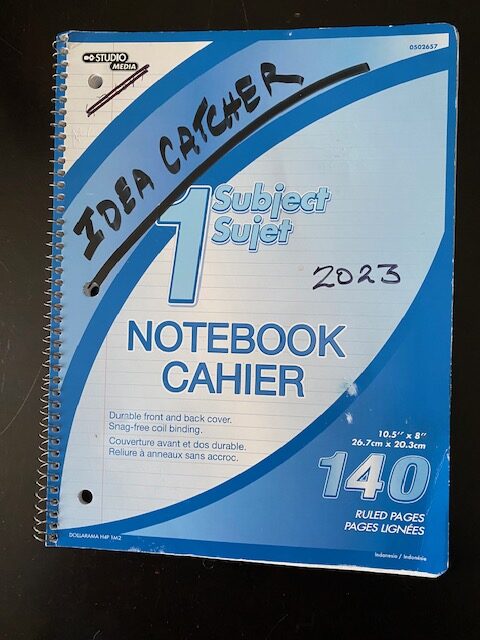Benefits of an “Idea Catcher”
Writing things down clears your short-term memory of all those ideas, thoughts, and things you plan to do “when you get time.” An ancient Chinese proverb says, “The faintest ink is more powerful than the strongest memory.” This is certainly true of our short-term memory, which can usually only hold about seven things before they start slipping away. (In my case it’s fewer than seven.) According to David Rock, author of Your Brain at Work, most of your hundreds of thoughts a minute never get much attention and disappear into the background. He mentioned one study that showed people on average hold a thought for only 10 seconds before moving on to something else. Useful ideas – sometimes brilliant ideas – are lost forever because they are not jotted down at the time. For example, have you ever said, “I thought of that years ago!” when you hear of a new product that captures the market? Oddly, you had not thought of it since it flashed through your mind long ago.
If you had jotted it down at the time, however, and revisited it later, it would have had a good chance of coming to fruition – even though you lost the paper napkin on which you had written the idea. And if you have a journal of sorts – an “idea catcher” in the form of a notebook that you carry in your pocket, purse, or computer bag, and the habit of reviewing those ideas and thoughts on a weekly basis, you will have a veritable goldmine at your disposal.
Benefits of an “idea catcher”
My “idea catcher” regularly supplies me with ideas for my newspaper column, blog articles, books, and quarterly newsletters. It was the source of the Chinese proverb quoted above, which appeared in a book by Daniel Amen titled, How to Conquer Worry and Anxiety. (I wouldn’t have remembered the source if I hadn’t recorded it in my “idea catcher.”) If you are a writer, speaker, trainer, manager, entrepreneur, or communicator of any kind (which covers everyone) I believe an “idea catcher” is essential. It is a time-saver, performance enhancer, and productivity-improver, all rolled into one.
If most things are in digital format these days, why not simply type or record the idea into your smartphone? I used to do something like that 40 years ago when pocket recorders became popular. It was convenient when driving or walking. But the out-of-sight-out-of-mind effect took place, and I frequently left the ideas buried in my pocket recorder instead of transferring them to my more visual in-your-face notebook. So, if you use an audio recorder of any kind or even voice-activated software, I recommend you write it longhand immediately afterward. The physical act of writing makes a greater impression on your brain. One of the most frequently used strategies for memorizing something is to write it down. Simply repeating it to yourself is not as effective.
Cursive writing also stimulates the brain – at least the parts of the brain that control thinking, memory, and language. The brain doesn’t learn as efficiently when information is typed or printed one letter at a time. Cursive writing may not be the fastest, but it is certainly faster than printing. It also promotes memory and learning and improves fine motor skills such as knitting and picking up objects. Putting pen to paper has its benefits – everything from language skills to memory and critical thinking.
Most people overestimate their memory ability. As David Allen says in his book, Getting Things Done, “Our minds are for having ideas, not storing them.” And it would be a shame to waste all that idea-generating power of your mind by ignoring what it creates. Also, attempting to remember something consumes the energy needed to get it done.
It has also been shown that unfinished tasks cause stress, and until you get closure on ideas, such as either doing them or writing them down, the brain views them as unfinished tasks. So, an additional advantage of writing things down is that it prevents stress.
Writing things down may seem like a minor suggestion, but it can have a major impact on your time, as well as on your performance, productivity, and creativity.


Recent Comments